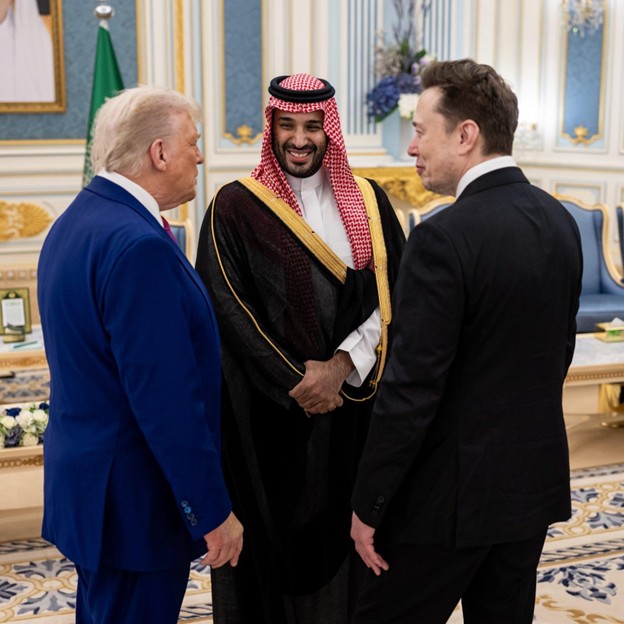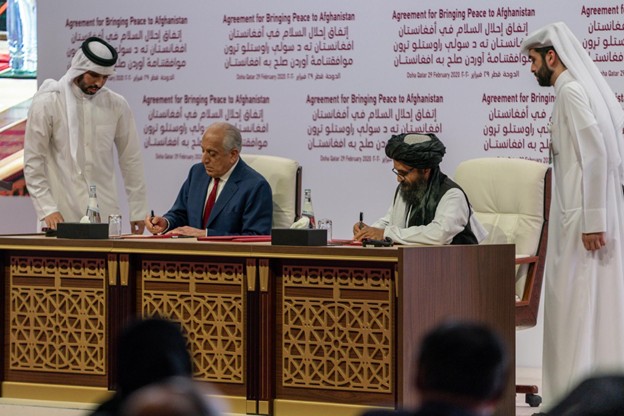
Cover image: Doha skyline, Qatar’s capital, symbolizing the Gulf’s growing economic and diplomatic influence. Photo by Nabil Magdy/ Pexels
For decades, the Middle East was boxed into a familiar Western narrative: a region trapped in cycles of political instability, economic underdevelopment, religious fanaticism, and recurring wars. Even Gulf states such as Saudi Arabia and Qatar — buoyed by oil wealth — were often portrayed as insulated but fragile, lacking the “real” resilience that comes from diversification.
Fast forward to 2025, and that story is beginning to fray. The Gulf is no longer simply riding an oil wave; it is rewriting its role in the world. Saudi Arabia and Qatar are no longer just rich neighbours in the desert — they are power brokers, investment magnets, and diplomatic fixers.
The ongoing Gaza war has underscored a shift in the region’s balance of power. Saudi Arabia, under Crown Prince Mohammed bin Salman (MBS), has taken a clear stand: no normalisation with Israel without a two-state solution. This signals a break from the days when United States (US) pressure alone could nudge Riyadh into line. MBS is not merely managing domestic reforms; he is playing at the global table with enough confidence to shape outcomes, not just react to them.
Expanding diplomatic influence
During the recent four-day flare-up between India and Pakistan, Saudi Arabia stepped in as a mediator — and helped de-escalate. That is not a role anyone would have assigned it two decades ago. Moreover, Riyadh is leading the renewed charge for Gaza cease-fire and Palestinian statehood – not just through diplomacy and rhetoric, but with tangible actions.
And then there is Syria. In a move that blindsided many, MBS reportedly persuaded US President Donald Trump to lift decades-old sanctions on Damascus. By backing the new Ahmed al-Sharaa government, Riyadh is signalling that stability in West Asia is part of its long game. Combined with historic normalisation and defence pacts with Iran, and you have a foreign policy rewriting old playbooks.
Trump’s visit: more than symbolic

President Donald Trump and Elon Musk with Saudi Crown Prince Mohammed bin Salman during Trump’s state visit to Saudi Arabia. Original image: Wikimedia Commons – President Trump and Crown Prince Mohammed bin Salman
When President Donald Trump picked Saudi Arabia for his first official trip of his second term, the optics alone were significant. But it was not just about photo opportunities. Major trade deals were signed, and Gulf states leveraged their wealth to extract real concessions.
The fact that Riyadh is now a facilitator in ceasefire talks between the US, Russia, and Ukraine shows just how far its diplomatic reach has stretched. The Gulf is no longer a stage where global powers act out rivalries — it is a player in its own right.
MBS’s Vision 2030 reforms are more than public relations slogans. The Kingdom is carving out new industries, from renewable energy to entertainment. The sports push — recruiting European football stars into the Saudi Pro League — is part brand-building, part business. At this pace, the league could rival Europe’s top five within a decade.
Saudi Arabia has also secured the 2034 Fédération Internationale de Football Association (FIFA) World Cup. Through its Public Investment Fund (PIF), Riyadh is buying stakes in everything from Newcastle United Football Club to London’s Heathrow Airport. Deals signed with India on the sidelines of the 2023 Group of Twenty (G20) summit in New Delhi underline Saudi Arabia’s global economic ambitions. These are not just trophy assets — they are footholds in the global economy.
Ambitious mega-projects like NEOM testify to the Kingdom’s determination to move beyond oil. Saudi Arabia is also making profitable strides in the energy sector by securing long-term deals that benefit both the Kingdom and the wider region. Most recently, Saudi Aramco signed an $11 billion (US) agreement with a BlackRock-led consortium.
In an official statement after the signing, Aramco president and chief executive officer (CEO) Amin H. Nasser said: “Jafurah is a cornerstone of our ambitious gas expansion programme, and the Global Infrastructure Partners-led consortium’s participation as investors demonstrates the attractive value proposition of the project. This foreign direct investment into the Kingdom also highlights the appeal of Aramco’s long-term strategy to the international investment community.”
Bayo Ogunlesi, chairman and CEO of Global Infrastructure Partners, added: “We are pleased to deepen our partnership with Aramco through our investment in Saudi Arabia’s natural gas infrastructure, a key pillar of global natural gas markets.”
The deal underscores the Kingdom’s firm position in the energy sector and highlights the growing role of foreign direct investment in such a lucrative market.
Qatar: The Gulf’s diplomatic bridge

US representative Zalmay Khalilzad (left) and Taliban representative Abdul Ghani Baradar (right) sign the agreement in Doha, Qatar on February 29, 2020. Photo: [State Department / Ron Przysucha] Public Domain)
Qatar, meanwhile, has perfected the art of mediation – from brokering ceasefires between Israel and Hamas, and facilitating talks between Iran and Israel, to negotiating between the US and the Taliban – and has built a reputation as a neutral, dependable go-between.
Although that reputation is being tested, the events of September 9 proved that Qatar’s diplomatic mettle is far from diminished. On that day, an Israeli airstrike — apparently targeting Hamas leadership in Doha — was carried out with impunity. Qatar condemned the strike as a reckless violation of its sovereignty. Yet, what followed was remarkable: an extraordinary summit convened in Doha that not only reaffirmed Qatar’s standing among Gulf nations but also turned Israel’s gamble into a diplomatic setback.
Qatar deftly leveraged the incident to secure key concessions on the Gaza front, helping advance the latest 21-point, US-led ceasefire proposal — one that lays early foundations for a viable Palestinian state. In the attack’s aftermath, momentum toward Palestinian statehood recognition in Europe accelerated, as if the strike had catalyzed a diplomatic awakening.
Ironically, Israel’s adventure deepened its own strategic anxieties. Its focus on Iran’s nuclear program was suddenly complicated by Pakistan’s entry into the regional security calculus. Through a newly minted Saudi-Pakistan defence pact, Islamabad has positioned itself as a potential security guarantor for the Gulf — a development that has added an entirely new dimension to West Asia’s strategic chessboard.
Far from diminishing Qatar’s influence, the episode appears to have tilted the dynamics of West Asia in favour of the Gulf. It is the product of extraordinary Saudi-Qatari statecraft and a rare degree of coordination among Gulf capitals. Doha’s ability to remain on good terms with both Washington and Moscow — while simultaneously holding its place as the world’s top liquefied natural gas (LNG) exporter — only enhances its indispensability. Energy security remains the region’s most potent leverage, and Qatar wields it with quiet confidence. In a century where gas is still king, Doha remains the bridge no power can afford to burn.
All this high-level manoeuvring is not just about headlines or summit handshakes. For the Gulf’s young people, this new era is about jobs beyond oil, greater cultural openness, and the hope of avoiding the conflicts that shaped earlier generations.
If the Saudi-Iran rapprochement holds, it could reduce the proxy wars that have drained the region for decades. If Syria’s reconstruction draws genuine international investment — already cautiously spearheaded by Saudi Arabia, which has pledged an initial $6.4 billion (US) following the collapse of Bashar al-Assad’s despotic regime and the rise of Ahmad al-Sharaa’s government — then millions of displaced Syrians may at last glimpse a credible path home. And if Qatar continues to mediate successfully, fewer crises might spiral into drawn-out wars.
The Gulf’s leaders are no longer content to be passive observers of global currents — they are shaping them. The combination of Saudi Arabia’s modernisation drive, its more pragmatic approach to religion, and its willingness to stake out independent foreign policy positions is changing how the region operates.
MBS has declared, “The Middle East will be the new Europe.” Lofty, yes — but in 2025, not so easy to dismiss as wishful thinking.
And perhaps, just perhaps, the architects of this transformation will prove that the Gulf’s story no longer has to be written by outsiders. Or, in the words of poet–philosopher Muhammad Iqbal: “Raise yourself to such heights that even fate must ask your consent before writing its destiny.”
While mountains remain for the Gulf’s leaders to climb — from the ongoing Gaza conflict to persistent instability in the Levant — they are nevertheless there to be climbed.
This article examines how the global silence over Sudan’s humanitarian...
This article examines the way artificial intelligence is transforming global...
This article reexamines the meaning of ASEAN neutrality in light...
This article analyzes the geopolitical and institutional significance of the...
This article examines how deepfakes have evolved from isolated digital...
This article critically examines the evolving contestation of the Responsibility...
This article contends that Trump’s high-value diplomacy in the Gulf...
This article examines how the EU-ASEAN partnership has significantly evolved...
This article examines how President Prabowo Subianto seeks to combine...
This article takes a look at how Prabowo’s UN address...
This article explores how Gulf states, particularly Saudi Arabia and...
This article examines Armenia’s blocked bid to join the Shanghai...
This article examines Indonesia’s recent acquisition of the Turkish-made KHAN...
This article explores how U.S. tariffs, intended to strengthen leverage...
This article explores how the OIC, despite its authority to...
This article examines how the 2025 recognition of Palestine by...
This article shows how the United States’ 19% tariff on...
This article reflects on the Thailand–Cambodia border dispute, capturing it...
This article examines how the absence of coordinated trade negotiations...
This article explores the strategic implications of the Indonesia–Turkey defence...
This article reveals how Hungary, a country that is frequently...
This article examines how a leaked phone conversation between the...
This article examines the 2025 border crisis between Thailand and...
This article explores the deep-rooted and multifaceted rivalry between Israel...
Leave A Comment